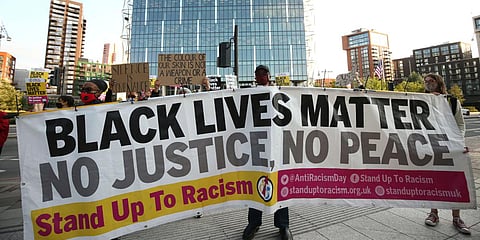

We are seeing the rise of social movements all over the world. Such a movement takes birth when there is perceived injustice in society and a section of affected people protest and demand social justice. We saw it in the United States and Hong Kong, in Belarus against a dictator and in Thailand against the king and so on. In many cases, it is to ensure democratic processes in an authoritarian country. It is also against exploitation, relative deprivation, environmental considerations or to end a bad custom or practice, or against class, caste or community tyranny.
About a year ago, we saw the Black Lives Matter movement in the US take centre stage again after the heinous murder of George Floyd. A racist white police officer pressed his knee into Floyd's neck till he died of suffocation. Such was the intensity of the brutality that it shocked the conscience of the whole planet. It started in the US but soon spread to nations such as the UK, France and Australia. Many years ago, Martin Luther King Jr had said, "No person should be judged by the colour of their skin, but by their content and character." The US saw for the first time the election of an African American president in Barack Obama and the last presidential poll witnessed the emergence of Kamala Harris as vice president. However, not much had changed for the community and hence the protests."
Many years ago, the Uttarakhand government had asked forest contractors to cut trees to make sports goods. The hill people joined together under the leadership of Sundarlal Bahuguna, hugged the trees and asked the contractors to fell them along with their bodies. It led to the formation of the Chipko movement, which became a major social-environmental campaign against deforestation.
According to the noted environmentalist Vandana Shiva, "Movements are major social and political processes ... and they transcend individual actors. They are significant precisely because they involve a multiplicity of people and events which contribute to a reinforcement of social change" (Staying Alive, 1988).
Social movements are of varied types such as those by tribals, peasants, trade unions and Dalits. Many of these movements have been ignored, but most of them had a lasting impact on raising consciousness, ensuring legal rights, providing employment, getting land to the poor and stopping money lenders from exploiting peasants. While trade union movements are often maligned, many social legislations to protect the human rights of workers in terms of wages, facilities and retirement benefits came into existence because of them.
At present we are witnessing the farmers' movement for more than a year. It is increasing in strength and can take an anarchical turn as it is demonstrating a lack of established leadership. The Centre has made some feeble attempts to address the misunderstanding, but it needs much greater protracted negotiation by HR specialists who are trained to solve such issues rather than some politicians and babus. Many political parties are also taking advantage of the chaos to use it to try and form a political alternative against the government.
If you study social movements very closely, you will find that most of them have not been well-documented. Ghanshyam Shah, in his book Social movements in India (2004), writes: "Indian scholars have not paid enough attention to the methodological issues involved in the study of various movements. Most of the studies on movements are sketchy and descriptive and are based on data derived from secondary sources - mainly newspapers."
We need to examine why most of the social/ protest movements have died a quick death, even though many were meaningful and had a long-term impact. Most of them started as a protest movement based on an issue and did not have a clearly articulated vision, strategy, policies, staffing, authority systems and funding. They were an emotional reaction and often led by a charismatic leader.
As most of these movements were against the establishment, the leaders were booked under various criminal acts and jailed. Most of them caved in once the leader was not there as they did not have a robust organisation structure. However, in contrast, we also see movements such as the Dravidian or Dalit campaigns, which have been part of a political process, last for a much longer period and even occupy political power.
We thus find that if any campaign becomes a socio-political movement, emerges as a political party and has a proper vision, strategy and organisation structure, it has a greater longevity. But those without an organisation just remain a protest movement for a short period and fizzle out.
(The writer is founder & CEO, Sri Ramakrishna International Institute of Management and can be reached at ashoke.maitra@gmail.com)